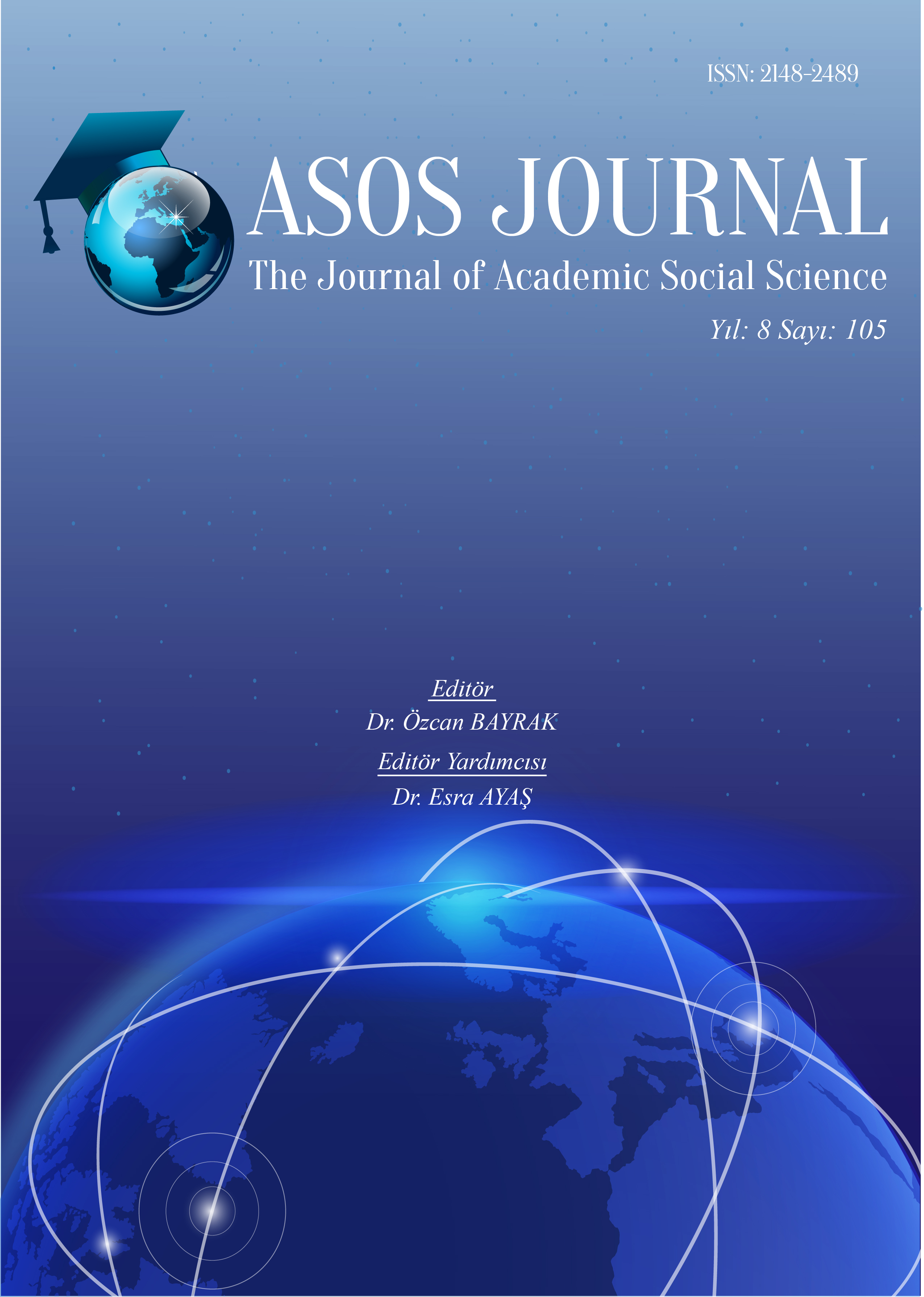Author :
Abstract
Çalışma bireysel düzeyde yeniden dağılım tercihinin belirleyicilerini analiz etmeyi amaçlamıştır. Bu amaçla hipotez geliştirmek ve ampirik bölüme dayanak oluşturmak üzere teorik ve ampirik literatür incelenmiştir. Ampirik inceleme yüzden fazla ülke için geniş bir zaman boyutunu kapsayacak şekilde toplanan anket verilerini içeren WVS/EVS verilerine dayanmaktadır. Sonuçlar, yaş, doğum yılı, cinsiyet, medeni hal gibi demografik ve sosyo-ekonomik değişkenlerin yeniden dağılım tercihlerini belirlemek bakımından anlamlı olduğunu göstermektedir. Rasyonel tercih yaklaşımını ve POUM hipotezini test etmek üzere gelir düzeyi, görece gelir ve eğitimin etkisini incelediğimizde bu yaklaşımlara paralel olarak değişkenler üzerinde negatif katsayılar bulunmuştur. Adalet, kadercilik, karşılıklılık, özgecilik ve güven gibi bireysel değer ve normlar anlamlı ve yeniden dağılım tercihini etkileyen değişkenlerdir. Özellikle bireylerin yoksulluğun nedenine dair anlayışları yeniden dağılım tercihi üzerinde yüksek derecede etkilidir. Sosyal kimlik ve kültürün etkisini test etmek üzere, din, din ve dindarlık etkileşimi, siyasal ideoloji, sosyal sınıf ve milliyetçilik incelenmiş ve bu değişkenlerin yeniden dağılımı etkilediği bulunmuştur.
Keywords
Abstract
The study examines the determinants of redistribution preferences at the individual level. We first review theoretical and empirical literature to establish a framework for empirical analyses. Then, we provide the empirical evidence based on the data from World Value Survey (WVS) and European Value Survey (EVS) covering a hundred countries. Results reveal that demographic and socioeconomic factors such as age, birth cohort, gender, marital status influence the redistribution preferences. Income level, relative income, education are significant variables with negative coefficients in the line with the traditional approach of economics and the POUM hypothesis. Besides, we examine further the effect of individual values, norms such as fairness, life control feeling, reciprocity, altruism, and trust. All variables were significant, but especially fairness was higher coefficients. It considered a religion, the interaction of religion with religiousness, ideology, social class, and nationalism as indicators of culture and identity. All variables, especially religion, were significant and important variables.
Keywords
- Alesina, A., and Angeletos, G. M. (2005). "Fairness and Redistribution: US vs. Europe." American Economic Review, 95: 913-35.
- Alesina, A., and Giuliano, P. (2007). “The Power of the Family.” NBER Working Papers (13051).
- Alesina, A., and Giuliano, P. (2009). “Preferences for redistribution.” NBER Working Papers (14825).
- Alesina, A., and Glaeser, E. (2004). Fighting Poverty in the US and Europe: A World of Difference, Oxford University Press, Oxford UK:
- Andreoni, J., and Vesterlund, L. (2001). "Which is the Fair Sex? Gender Differences in Altruism." Quarterly Journal of Economics, 116(1): 293–312.
- Bavetta, S., Patti, B. M., and Navarra, P. (2009). Autonomy Freedom, Preferences for Redistribution and the Individual's Willingness to Work. mimoe. https://www.bancaditalia.it/pubblicazioni/altri-atti-seminari/2010/bavetta_100610.pdf, (Erişim Tarihi: 16.10.2018).
- Bénabou, R., and Ok, E. A. (2001). "Social mobility and the demand for redistribution: The POUM hypothesis." The Quarterly Journal of Economics, 116(2): 447-487.
- Benebou, R., and Tirole, J. (2006). "Beliefs in a Just World and Redistributive Politics." Quarterly Journal of Economics, 121(2): 699-746.
- Camerer, C. F. (2003). Behavioral Game Theory: Experiments in Strategic Interaction, Princeton University, Princeton, NJ.
- Clark, A., and Lelkes, O. (2005). "Deliver Us from Evil: Religion as Insurance." European Center for Social Welfare Policy and Research, PER Working Paper 06/03.
- Corneo, G. and Grüner, H. P. (2000). "Social Limits to Redistribution." American Economic Review, (90): 1491-1507.
- Dahlberg, M., Edmark, K., and Lundqvist, H. (2011). "Ethnic Diversity and Preferences for Redistribution." CESifo Working Paper, no. 3325.
- Dehajia, R., DeLeire, T., and Luttmer, E. F. (2007). "Insuring Consumption and Hhappiness Through Religious Organizations." Journal of Public Economics, (91): 259-279.
- Esarey, J., Salmon, T., and Barrilleaux, C. (2012). "What Motivates Political Preferences? Self- Interest, Ideology, and Fairness in a Labaratory Democracy." Economic Inquiry, 50(3): 604–624.
- Esping-Andersen, G. (1999). Social Foundations of Postindustrial Economies. Oxford University Press, Oxford, UK.
- Fajnzylber, P., Lederman, D., and Loayza, N. (2002). "Inequality and Violent Crime." The Journal of Law and Economics, 45(1): 1-40.
- Fong, C. M., and Luttmer, E. F. (2009). "What determines giving to Hurricane Katrina victims? Experimental evidence on racial group loyalty." American Economic Journal: Applied Economics, 1: 64–87.
- Giuliano, P., and Spilimbergo, A. (2008). Growing Up in Bad Times: Macroeconomic Volatility and the Formation of Beliefs. mimeo. http://www.eief.it/files/2008/11/growingup_conferences.pdf, (Erişim Tarihi: 16.10.2018).
- Hess, G. D. (2004). "Marriage and Consumption Insurance: What’s Love Got to Do with It?" Journal of Political Economy, (112): 290-318.
- Luttmer, E. (2001). "Group Loyalty and the Taste for Redistribution." Journal of Political Economy, 109(3): 500-528.
- Luttmer, E., and Singhal, M. (2008). Culture, Context and the Taste for Redistribution. NBER Working Papers, (14268).
- Meltzer, A. H., and Richard, S. F. (1981). "A Rational Theory of the Size of the Government." Journal of Political Economy, 89 (5): 914–27.
- Neher, F. (2012). "Preferences for Redistribution Around the World." Free University Berlin, School of Business ve Economics Discussion Papers, 2012/2.
- Piketty, T. (1995). "Social Mobility and Redistributive Politics." The Quarterly Journel of Economics, (110): 551-84.
- Scheve, K., and Stasavage, D. (2006). "Religion and Preferences for Social Insurance." Quarterly Journal of Political Science, 1(3): 255-286.
- Shayo, M. (2009). "A Model of Social Identity with an Application to Political Economy: Nation, Class, and Redistribution." American Political Science Review, 103(2): 147– 174.
- Todd, E. (1985). The Eplanation of Ideology: Family Structures and Social Systems, Basil Blackwell Oxford UK.
